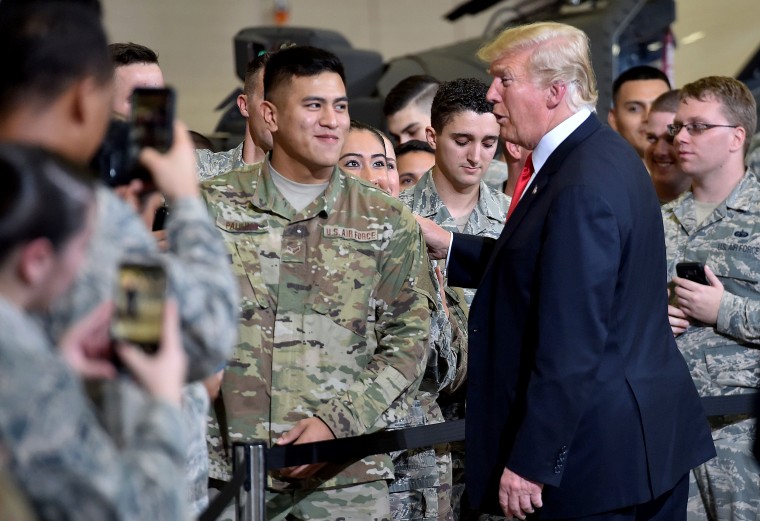President Donald Trump recently announced plans to deploy up to 15,000 troops to secure the U.S.-Mexico border in anticipation of a migrant caravan slowly moving north. The refugees, migrants, and asylum-seekers are traveling largely on foot and said to number in the thousands; many appear to be families fleeing significant violence and deplorable conditions in home countries like Honduras.
We do not doubt that the overwhelming majority of these travelers seek a better life and an honest living in the U.S. Nor do we question the ability of our troops — the best in the world — and their dedication to the defense of our nation. However, we do question the efficacy of — and the motivation behind — this particular deployment. Is this about keeping our country safe, or is it about a looming midterm election?
We question the efficacy of — and the motivation behind — this particular deployment. Is this about keeping our country safe, or is it about a looming midterm election?
Trump claims that this troop deployment is necessary to secure our borders and keep out, by force if necessary, immigrants seeking a better life. But there are several problems with this claim. First, some facts: Studies have consistently shown that immigrant communities commit crimes at lower rates than other communities in our country.
Logistically, there are other complications. The U.S. Customs and Border Patrol (CBP) is the agency primarily responsible for our border security. CBP, a part of the Department of Homeland Security, is generally effective — given an inordinately difficult task — at maintaining the integrity of our borders and ports of entry.
The numbers bear out just how hard its job is. CBP, according to its website, employs more than 60,000 people. That same website also notes that CBP enforces “hundreds of U.S. laws and regulations. On a typical day, CBP welcomes nearly one million visitors, screens more than 67,000 cargo containers, arrests more than 1,100 individuals, and seizes nearly 6 tons of illicit drugs.” In other words, CBP is a multifaceted organization with an arduous mission. The notion that 15,000 troops can quickly and seamlessly integrate its operations into this 60,000-person law enforcement agency is, at best, far-fetched.
That said, Trump’s decision is lawful. A presidential deployment of troops to the border is permissible under an 1878 law, and its amendments. The Posse Comitatus Act, passed after Reconstruction to end the policing of elections by federal troops in former Confederate states, has been heralded as a safeguard against the direct involvement of our military in domestic affairs. Though the act generally prohibits U.S. military personnel from direct participation in law enforcement activities, there are exceptions. Based on those exceptions, a president is authorized to use the military under certain conditions to help enforce federal law, including along the border.
Indeed, other presidents have deployed the military in limited circumstances. President Dwight Eisenhower federalized the National Guard to protect African American students integrating an all-white school, President Ronald Reagan used troops to aid drug enforcement efforts and the first President Bush deployed a relatively small number of troops to the Los Angeles riots in 1992.
Further, both the second President Bush and President Barack Obama deployed troops to the southern border, primarily in a passive role. These troops mainly conducted surveillance, trained some law enforcement personnel, and installed fences. Each of those border deployments was much smaller than the one proposed by Trump and, most importantly, did not appear to be timed to influence an election.
In real life, you cannot just send troops to the border and create a unified “wall of people,” as Trump said recently. Moreover, the enforcement of federal law is inordinately complex. It takes time, resources and close supervision, for example, to integrate highly trained state and local law enforcement officers into federal law enforcement operations. Cross-designated task force officers are enormously valuable to their federal law enforcement counterparts at the FBI, DEA and ATF, among other places, but the integration of systems, policies and methodologies does not happen overnight (and this is in a law enforcement to law enforcement context). We cannot imagine how cumbersome it would be to try to integrate thousands of troops into the active and ongoing enforcement of federal immigration law on the border.
As candidates campaign on issues like the economy and health care, Trump has repeatedly shifted the conversation back to immigration.
Which brings us back to what really seems to be going on. In response to a question posed after his recent remarks on border security, Trump claimed there is “nothing political” about the deployment. However, the timing sends a pretty clear signal — that he has ordered troops to the border as part of a strategy to control the narrative in the days before America heads to the polls. Indeed, as candidates campaign on issues like the economy and health care, Trump has repeatedly shifted the conversation back to immigration, which seems to resonate with portions of his base.
And that raises another significant concern. We ask much of our troops. We send them around the world on difficult and dangerous missions. And we know of their many sacrifices — not unlike the sacrifices of the men and women of law enforcement. So, though Trump has the legal authority to deploy troops to the Mexican border, it is a bad idea. Inserting 15,000 troops into a complex law enforcement mission is, to put it mildly, unwieldy. And to the extent that our noble service members are being used as part of a political strategy — and that seems to be the case — it is a profoundly distressing plan.
